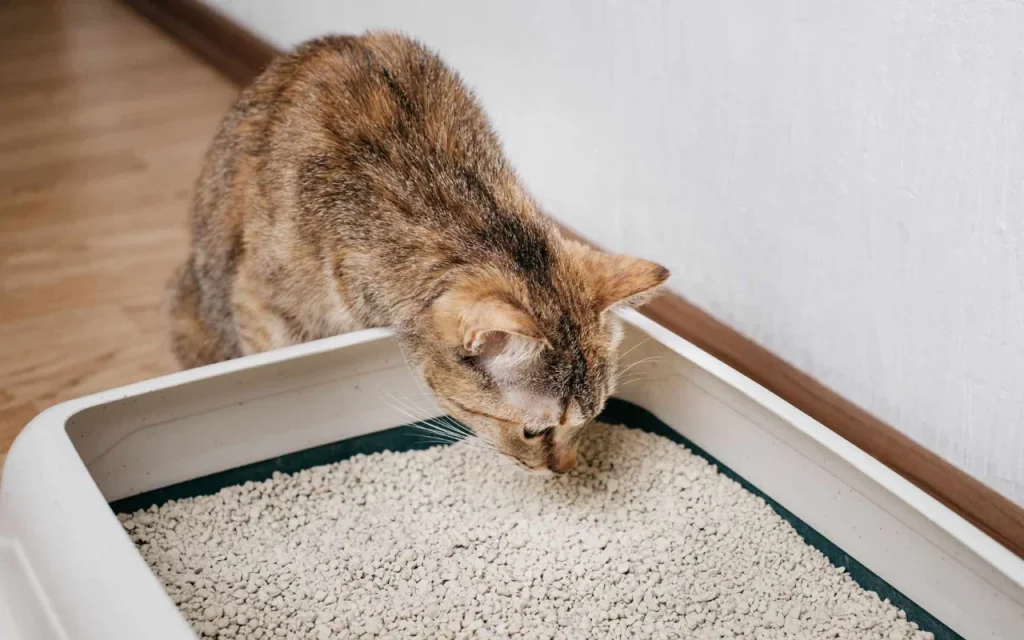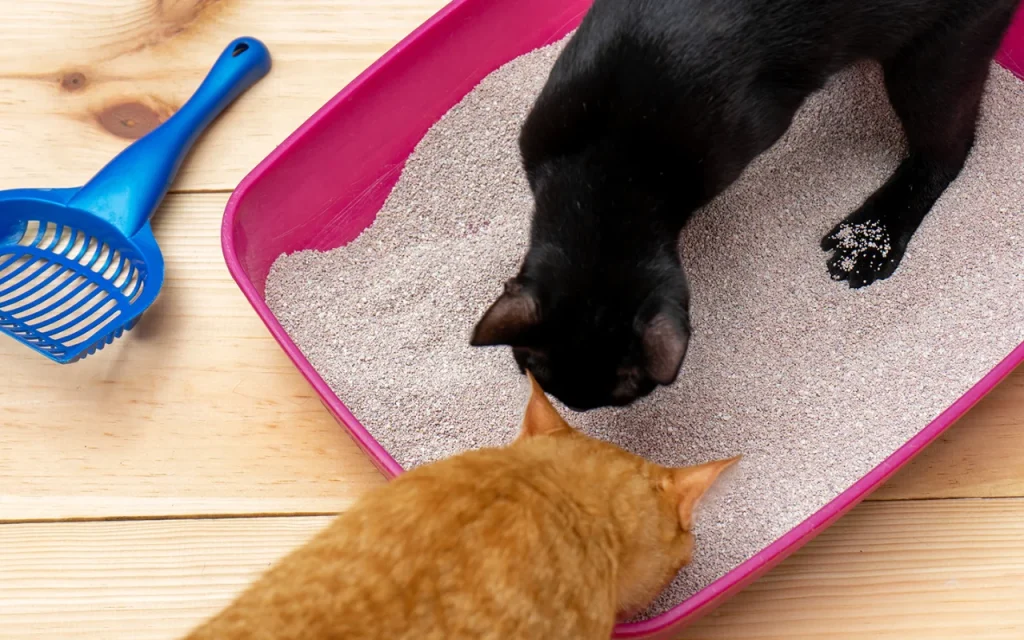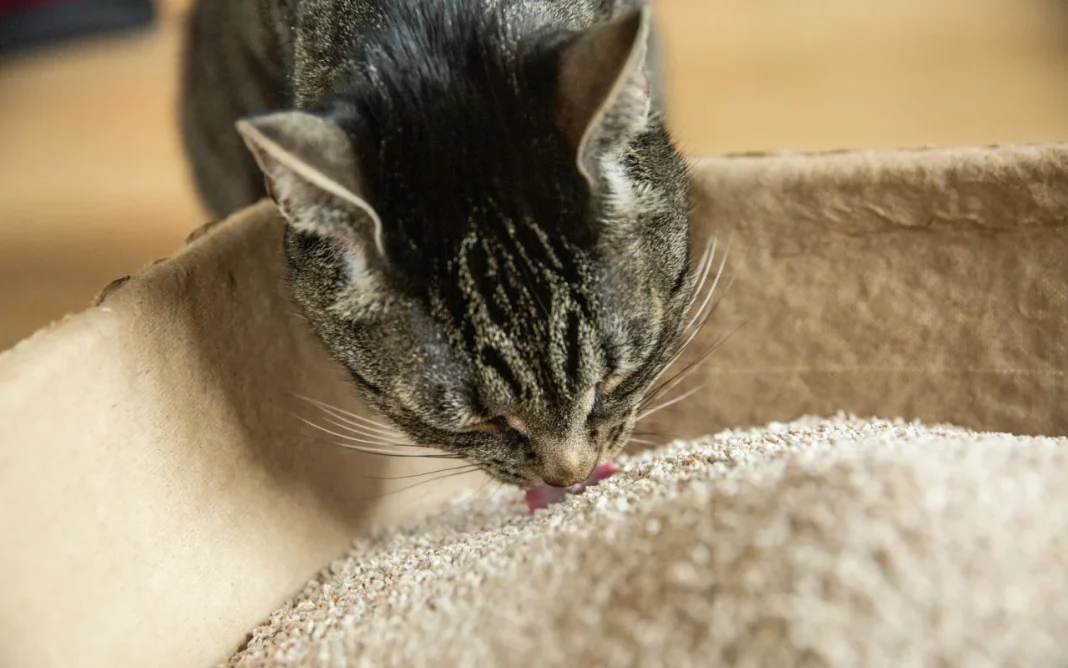You walk over to the litter box, ready for the daily scoop, and you spot it – your cat isn’t just using the litter box, they’re actually eating the litter. Cue the internal alarm bells, right? It’s a behavior that can seem incredibly strange, a bit gross, and understandably, pretty worrying for any cat parent. “Why on earth would they do that?” is usually the first question that pops into your head.
Well, as a vet, I can tell you that when a cat starts munching on their litter, it’s definitely a sign that something’s up, and it’s not just a weird foodie phase they’re going through. This behavior, which is a type of pica (that’s the technical term for eating non-food items), can actually be a clue to a whole bunch of different things going on with your furry friend, ranging from something missing in their diet, to stress, or even an underlying medical issue.
So, let’s have a friendly chat about some of the common reasons why your cat might be tempted to snack on their toilet substrate, what it could all mean, and, most importantly, when it’s definitely time to get your vet involved to play detective. We’ll touch on at least ten different angles to consider!
That Puzzling Habit: What’s Up With Cats Eating Litter?
First off, if you see this happening, try not to panic, but do take it seriously. It’s not “normal” cat behavior in the way that, say, chasing a laser pointer is. It’s their way of telling us something needs a closer look.
Could Their Body Be Trying to Tell Them Something? Medical Reasons to Explore
You know, as a vet, whenever an owner tells me their cat has started eating litter, my mind immediately starts running through a checklist of potential medical reasons. Often, the first thing we really want to rule out is something physical going on.
You ever get a weird craving for something and you just have to have it? Well, sometimes when a cat starts eating odd stuff like litter, it makes me wonder if their body is trying to tell them they’re missing something important. A classic one we vets think about is anemia – you know, not enough red blood cells, often linked to low iron. And guess what? Some clay litters actually have minerals in them. So, a cat who’s anemic might just be trying, in their own instinctive way, to get what their body is screaming out for. Other out-of-whack minerals or a lack of certain vitamins? Yeah, those could theoretically nudge them towards pica too. It’s less common if they’re on a good, balanced cat food, but it’s definitely on our ‘things to check’ list.
And then there are those sneaky underlying illnesses. Sometimes, when a cat starts eating things they really shouldn’t, it can be a sign that something else is going on deeper inside. I’ve seen cases where things like diabetes, or those tricky kidney issues we vets see a lot, or even an overactive thyroid (hyperthyroidism, we call it) can throw a cat’s whole system out of whack – their appetite, how they feel, everything – and that can sometimes, oddly enough, lead to them munching on weird stuff. Even, though it’s pretty rare, thank goodness, really serious things like brain tumors or other neurological quirks could make a cat act in very bizarre ways, and that might include eating things that aren’t food. It’s not the first thing we jump to, but if a cat keeps eating litter and we can’t find any other reason, it’s something a vet would definitely want to be sure isn’t happening.
Is It All In Their Head (Or Their Environment)? Behavioral Quirks and Clues

If we’ve had a good look and can’t find an obvious medical culprit, then we start thinking more about behavioral reasons. And there are quite a few possibilities here too!
You know tiny kittens, right? Everything, and I mean everything, goes in the mouth! It’s how they check out their brand-new world. So, if your little fluff-nugget has a tentative nibble of litter, especially if it’s a new texture they’ve just encountered, try not to hit the panic button straight away. Often, it’s just them thinking, ‘Hmm, what’s this crunchy stuff?’ Most of the time, they figure out pretty fast that it’s not exactly gourmet dining and move on to more appropriate chew toys.
Then there’s the cat who’s just plain bored out of their little skull. Picture this: not enough zoomy games, no interesting bird TV at the window, maybe you’re super busy… well, a cat’s gotta do something, right? And sometimes that ‘something’ ends up being as weird as ‘Hmm, I wonder what these litter bits taste like today?’ It can be their way of creating a bit of (misguided) excitement or just interacting with something.
And oh boy, can stress do funny things to cats! They’re such sensitive little souls, aren’t they? Imagine there’s a big upheaval – maybe you’ve just moved, or a new dog has joined the family, or even your work hours have gone all topsy-turvy. For some cats, that feeling of being unsettled or anxious can actually trigger them to do some pretty odd stuff, and yup, munching on litter can be one of those peculiar coping mechanisms. It’s almost like a nervous habit for them.
- Compulsive Behavior: Sometimes, what starts as a stress response can, over time, turn into a more ingrained, compulsive habit that’s harder to break, even if the original stressor is gone.
- “Look at Me!” (Attention-Seeking): Our cats are clever! If they realize that munching on litter gets an immediate (even if negative) reaction from you, some cats might just learn that it’s a surefire way to get your undivided attention.
Could the Litter Box Itself Be an Unexpected Temptation?
It sounds a bit odd, but sometimes the litter itself can play a role.
- Is it… Tasty? (Well, to a Cat!): Some types of litter might be more appealing to a curious cat. For example, litters made from corn or wheat could, to a cat, smell or taste a tiny bit like food, especially if they’re feeling a bit peckish or are missing something in their diet. Even some clay-based litters might attract a cat who’s deficient in certain minerals, as we mentioned.
- Texture and Mouthfeel: Just the texture of certain litters might be intriguing for some cats to explore with their mouths.
Okay, This is Happening – When to Really Worry & What You Should Do

Right then, so your cat’s been spotted nibbling on the litter. And you’re thinking, ‘Okay, is this just a weird cat quirk, or is this a ‘Houston, we have a problem’ kind of moment?’ Well, let me put it this way: if you see your cat making a habit of it, not just a one-off curious taste as a tiny kitten maybe, then yeah, a little bell should be ringing. It’s just not standard cat procedure, you know? Getting to the ‘why’ of it, and sooner rather than later, is always where I’d lean.
Definitely make that call if:
- It’s a new behavior, especially in an adult cat who’s never done it before.
- They seem to be eating a significant amount of litter.
- It’s happening frequently or obsessively.
- You see any other signs that they’re not feeling well – things like vomiting, diarrhea, constipation (litter can cause blockages!), lethargy, changes in appetite or thirst, weight loss, or any other behavioral changes.
- Now, quick question – what kind of litter are you using? Because if it’s a clumping kind, that makes my vet ears perk up right away. That stuff is designed to do exactly what it says on the tin – clump up tight when it gets wet. Imagine what happens if your cat actually eats it. It can turn into a solid, almost cement-like lump inside their tummy or their intestines. And that? That’s a recipe for a super dangerous blockage, often meaning emergency surgery. Seriously, that’s a proper ‘get to the vet right now’ situation.
What Your Vet Will Likely Do:
So, what happens when you bring your litter-eater in to see us? Well, first off, we’ll want to have a really good natter with you – all about your cat’s background, what they eat, what life’s like at home for them, and any other little quirks or symptoms you’ve spotted. Then, we’ll give your cat a proper top-to-tail check-over. After that, we’ll almost certainly want to run a few tests to see what’s going on inside. Blood tests and a urine sample are usually where we start – they can tell us heaps about whether they’re anemic, if their nutrition is off-balance, or if there are any clues pointing towards those sneaky illnesses like kidney trouble, diabetes, or thyroid issues. And if we’re worried they might have actually swallowed a load of litter and caused a blockage, we might need to take some pictures inside with an x-ray or an ultrasound scan.
What Can You Do at Home? (After the Vet Visit!):
Once your vet has ruled out (or started treating) any medical causes, there are things you can do at home, often based on your vet’s advice:
- The Vet is Your First Stop – Always! I know I’m repeating myself, but it’s that important!
- Consider a Litter Change: If no medical issue is found, try switching to a non-clumping litter, or one that’s less likely to be appealing (e.g., if you’re using a corn-based one, try a paper-based or pine one, or vice-versa). Make any litter changes gradually, though, as some cats are very fussy about sudden toilet switch-ups!
- Boost Their Diet (With Vet Guidance!): If a nutritional deficiency is suspected, your vet will guide you on the best food or supplements. Please don’t try to supplement minerals on your own, as that can be dangerous.
- If it turns out your cat’s just bored stiff, well, it’s time to turn your home into a feline funhouse! Think more playtime with you (get that feather wand swishing!), a good rotation of interesting toys so they don’t get stale, those clever puzzle feeders that make them work their brain for treats, and maybe a nice tall cat tree by a window so they can supervise the local bird population. Making their world more exciting can sometimes make weird snacks less appealing.
- And if stress seems to be the villain? Then it’s all about trying to create a super chill vibe for your kitty. See if you can pinpoint what might be making them anxious – a new pet? Loud noises? Not enough quiet hiding spots where they feel totally safe? Sometimes just making their routine really predictable, giving them lots of secure little dens, and maybe even trying one of those Feliway pheromone diffusers can help an edgy cat feel a whole lot more secure in their own fur.
- Now, this one’s a bit sneaky – if you reckon your cat might just be doing it to get you to look at them (and yep, some cats are that clever!), try your very best not to make a massive song and dance when you catch them in the act. Instead, just calmly interrupt them – maybe a little clap of your hands or a sudden (but not scary) noise to make them look up. Then, the moment they stop their litter buffet, try to get them interested in something much better, like a fun game with their favorite toy.
The Bottom Line on Litter Snacking
Seeing your cat eat litter can be a bit alarming, can’t it? But remember, it’s usually their way of signaling that something, either physically or emotionally, isn’t quite right. By working with your vet to uncover the cause and by making some thoughtful adjustments at home, you can often help your furry friend kick this unusual habit and get back to just using their litter box for its intended, much less worrying, purpose!











